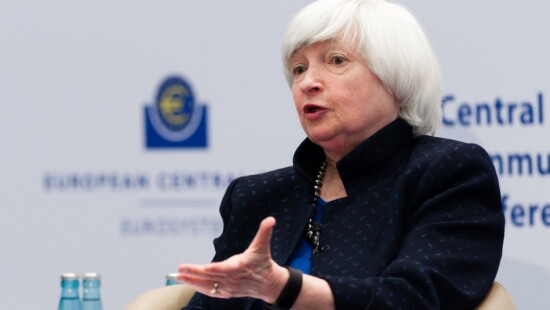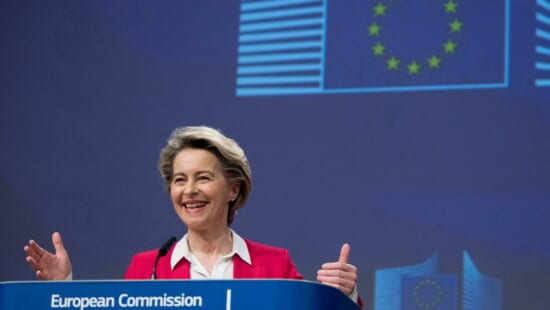Adesso si deve vaccinare a tutto spiano, convocando per classi d’età e, se del caso, vaccinando i giovani passanti; contemporaneamente, però, si deve non solo incenerire la logica corporativa, ma non farne un alibi e affrontare il nodo delle banche dati e dell’amministrazione pubblica. Il commento di Davide Giacalone
Archivi
Pechino perde la battaglia delle banche con gli Usa
Per la prima volta in quattro anni le grandi banche statali cinesi vedranno i propri utili ridursi, fino all’8,3%. Mentre negli Stati Uniti, complice la miglior salute, il Tesoro autorizza gli istituti a pagare i dividendi agli azionisti
Dal gas al petrolio, quanto costa il blocco di Suez. Parla Tabarelli
Il blocco del canale in cui transita il 13% del commercio mondiale, petrolio in testa, secondo il presidente di Nomisma Energia innescherà una spirale rialzista, che non riguarderà solo l’oro nero. In compenso, però…
2020, l’anno dei pagamenti elettronici… e dei contanti. I numeri sorprendenti
Nell’anno del cashless e dei pagamenti elettronici, il numero di banconote in circolazione è più che raddoppiato rispetto al 2019 (+130%). Una buona parte sarebbe “dormiente”, cioè a scopo di risparmio, mentre una fetta non indifferente circola all’estero
Grecia, un perno dello scacchiere euromediterraneo
Nel giorno del bicentenario dalla dichiarazione della Guerra d’Indipendenza della Grecia un’analisi di Francesco De Palo porta alla luce una serie di elementi distinti ma accomunati da un intrigante e delicatissimo fil rouge geopolitico. La Grecia si è fatta da crisalide farfalla, un passaggio determinante ma anche altamente rischioso, in considerazione del fatto che molte aspettative, dense e concatenanti, si sono riversate improvvisamente al centro dell’Egeo
Tra Bennett e Netanyahu c’è un terzo incomodo: la first lady Sara
Il carattere della moglie del premier israeliano è noto da tempo. Durante lo scandalo del conto di Netanyahu nel paradiso fiscale di Jersey, nel 2014, l’attenzione si è concentrata sulle spese personali della moglie Sara, motivo di critiche e discussioni in Israele
Zte-Fastweb, il Copasir applaude la mossa di Draghi
Elio Vito parla di “decisione rispettosa delle conclusioni unanimi del Copasir”. Enrico Borghi di “decisione importante e coerente”. I componenti del comitato di controllo degli 007 applaudono il golden power del governo sul contratto fra Fastweb, Askey e Zte. Nel 2020 impennata di procedimenti sul 5G
L'asse franco-tedesco traballa sul Fcas. Ecco gli spazi per l'Italia
Qualche giorno fa, i vertici di Dassault e Airbus sono apparsi di fronte alla commissione Difesa del Senato francese. Hanno palesato tutte le divergenze industriali, da inserire nelle frizioni politiche tra Berlino e Parigi che hanno già fatto traballare l’asse a due. Ecco gli spazi per l’Italia
Covid-19, arrivate altre 270mila dosi di AstraZeneca all'Hub Difesa. Il video
Covid-19, arrivate altre 270mila dosi di AstraZeneca all'Hub Difesa [embedyt] https://www.youtube.com/watch?v=gBTLrWo207k[/embedyt] Pratica di Mare, 25 mar. (askanews) - Nella mattinata del 24 marzo 2021, all'hub nazionale vaccini della Difesa, all'interno dell'aeroporto militare di Pratica di Mare, sono arrivate altre 270mila dosi del vaccino anti-Covid19 di AstraZeneca. La fornitura - spiega una nota - è in linea con le previsioni del…
A che punto è l'Ue? Dal Consiglio europeo la risposta. Scrive Balducci
La vicenda dei vaccini è comunque utile per capire a che punto si trovi il processo di costruzione dell’Europa. Per questo bisognerebbe fare attenzione ai risultati di questo Consiglio europeo. Il commento di Massimo Balducci

















